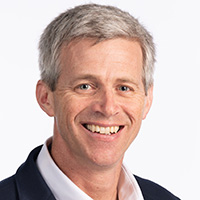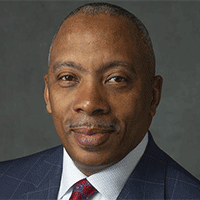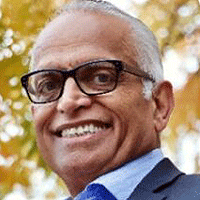
Monday, November 17, 8:00am – 9:00am
Tim Lieuwen
Executive Vice President for Research
Georgia Institute of Technology
2025 ASME Medal Recipient
Keynote Title: Patterns and Structure in the Fury and Noise: Coherent Structures and Organized Dynamics in Modern Power Systems
Abstract: Future propulsion and power systems will be profoundly shaped by societal drivers including decarbonization, national security, and resilience. Addressing these challenges also motivates a rich set of fundamental problems in fluid mechanics and combustion. The internal flows of aircraft engines and power plants, for example, exhibit fascinating and beautiful instabilities—phenomena that are scientifically compelling in their own right. This keynote will span from fundamentals to current applications at the intersection of combustion and fluid mechanics, offering insights for industry, researchers, and students alike.
Biography: Tim Lieuwen is the executive vice president for research (EVPR) at the Georgia Institute of Technology. In this role, he oversees the Institute's $1.37 billion portfolio of research, economic development, and sponsored activities. This includes leadership of the Georgia Tech Research Institute (GTRI), the Enterprise Innovation Institute, nine interdisciplinary research institutes (IRIs), and related research administrative support units.
In his 25-plus years at Georgia Tech, Lieuwen earned his master's and Ph.D. degrees in mechanical engineering (1996 and 1999, respectively) and has held multiple leadership positions. He previously served as the executive director of the Strategic Energy Institute (SEI) and interim chair of the Daniel Guggenheim School of Aerospace Engineering.
Lieuwen has received numerous honors and recognition for his work in clean energy systems and policy, national security, and regional economic development. Additionally, he has been awarded the titles of Regents' Professor and the David S. Lewis, Jr. Chair in AE. He is also a member of the National Academy of Engineering and is a fellow of the American Society of Mechanical Engineers and the American Institute of Aeronautics and Astronautics.

Tuesday, November 18, 11:10am – 12:10pm
Dr. Calvin Mackie Ph.D.
Founder and CEO of STEM Nola and STEM Global Action
ASME 2025 Ralph Coats Roe Medal Recipient
Keynote Title: Tinkers of Today are the Innovators of Tomorrow!
Abstract: Educators acknowledge that when children are allowed to play and tinker, they explore the world around them, figuring out materials and testing the limits of objects and the environment around them. This process develops fine motor skills, and often, the combination of thinking and calculating during tinkering, leads to a vibrant imagination and the building of things from any materials a kid can find.
Today, with so much attention on new technology in the home and classroom, advancing motor skills and stimulating the imaginations of our children too often takes a backseat. When tinkering, a child is continuously asking, "Why does this work or why isn't that working?" We must keep our children's minds and hands engaged if we want them to blossom into the next generation's inventors and STEM leaders.
Every child, regardless of their zip code, race, or gender, should have access to high-quality STEM education and career opportunities. STEM NOLA offers a powerful, innovative cadre of community-based and student-centered programming that directly addresses historical challenges and barriers to increase STEM access for all, and especially for under-served and low-resourced youth and communities. This presentation provides an overview of STEM NOLA's core programming, particularly its approach to captivating the hearts and minds of hundreds of youths and organizations across the world.
Biography: Dr. Calvin Mackie is an award winning mentor, inventor, author, former engineering professor, internationally renowned speaker and successful entrepreneur. He is the founder and chief executive officer of STEM NOLA, the premiere national STEM (science, technology, engineering and mathematics) program that designs and delivers activities, programs and events to K-12 students, families and communities.
Dr. Mackie is a dedicated advocate for STEM education and works tirelessly to inspire the next generation of innovators, creators and entrepreneurs across America, engage with them and expose them to quality learning experiences that prepare them for exciting career opportunities in STEM-related fields. In 11 years, STEM NOLA has engaged over 200,000 mostly low-income low-resourced K-12 students in hands-on project-based STEM activities across the country.
Mackie graduated from Morehouse College earning a BS in Mathematics in 1990 and was simultaneously awarded a BS in Mechanical Engineering from Georgia Tech, where he subsequently earned his Master's and Ph.D. in Mechanical Engineering in 1996. He served on the engineering faculty at Tulane University for twelve years. Mackie has won numerous awards including the 2003 Presidential Award for Excellence in Science, Mathematics and Engineering Mentoring in a White House ceremony and currently serves on the Louisiana STEM (LA-STEM) advisory council.
Dr. Mackie received the 2019 Congressional Black Caucus Foundation Board's Chair (CBCF) Phoenix Award, the highest honor presented by CBCF. It recognizes individuals whose extraordinary achievements strengthen communities and improve the lives of individuals and families, nationally and globally.
Most recently Dr. Mackie was selected as one of 24 recipients of the national Eric and Wendy Schmidt Awards for Excellence in Science Communications. Given by the National Academies of Science, Engineering and Medicine, in partnership with Schmidt Futures, the award recognizes people who have made significant contributions to promoting and advancing science education and communication.
His inspirational memoir, A View from the Roof: Lessons for Life and Business, has been adopted as educational course material by numerous secondary and college teachers throughout the country. His latest book Grandma's Hands: Cherished Moments of Faith and Wisdom was published in 2012 and received a silver medal in the prestigious Living Now Book Awards. Dr. Mackie is a regular contributor to Forbes.com writing about public engagement in STEM.
Dr. Mackie is a devoted husband to his wife, Tracy, and father to his two sons, Myles Ahmad and Mason Amir.

Thursday, November 20, 12:15pm – 1:45pm
Chandrakant D. Patel
President
Chandrakant Patel Consulting
2025 ASME Honorary Member & ASME President's Award Recipient
Keynote Title: Rise of the Cyber Physical
Abstract: Social, economic, and ecological trends between supply and demand are the drivers of engineering innovations for a resilient future. Trends such as aging population, lack of subject matter experts in critical fields such as healthcare and physical infrastructure, resource constraints, economic disparities, military conflicts, and externalities such as environmental pollution are causing huge supply-demand imbalances.
As example, imbalance caused by lack of subject matter experts in healthcare motivates engineering innovations such as robotic surgery, automation, virtual reality management, and training systems. These cyber-physical systems must be built at scale by systemic integration of physical technologies and cyber technologies. A "full-stack" contributor is one who can put together the physical and cyber stack of technologies and build entire systems. Just working on the IT stack alone – from user to database – does not suffice.
Consider remote robotic surgery systems. These systems start with physical science domain knowledge and right set of actuators and sensors. Given a flexible, configurable, hardware platform one can layer information (cyber) technologies, including AI. The success of Physical AI enabled solutions necessitate such a comprehensive approach. And T-shaped practitioners with depth in physical sciences, breadth in cyber sciences, economics, social sciences, art, and culture.
The 19th century was the machine age, an age of domain fundamentals. 20th century was the cyber age, an age of human and organization data and cyber sciences. The 21st century cyber physical age, an age of machine generated data and domain fundamentals, is the integration of the two. ASME is uniquely positioned to shape engineering innovations in this age to craft solutions that matter for a resilient future. Please join me in the conversation at IMECE 2025.
Biography: A former Senior VP, Chief Engineer, and Senior Fellow at HP Inc. - Chandrakant has been a Silicon Valley contributor for 42 years. Formerly leading HP Labs, he has shaped advancements in data storage, chips, high performance computing systems, storage, networking, 3D additive manufacturing systems, and software platforms. Pioneering energy-efficient data center solutions, he founded the Smart Data Center research program at HP Laboratories that led to multi-billion-dollar data center infrastructure and services business. He is a recognized leader in AI, energy efficient computing, and sustainability.
With deep passion for fundamentals, and workforce development, he has also served as adjunct faculty in engineering at UC Berkeley, San Jose State, Santa Clara University and Chabot College for two decades. An IEEE Fellow, ASME Fellow, member of the National Academy of Engineering (NAE) and the Silicon Valley Engineering Hall of Fame, Chandrakant holds 167 US patents and has published more than 150 papers. He is a registered professional mechanical engineer in the State of California.
Chandrakant has served on the company board of Mphasis, an IT Services Company in India. He has also served on the Industrial Advisory Boards in EECS at UC Berkeley and Mechanical Engineering at Santa Clara University.
Sponsored By:
